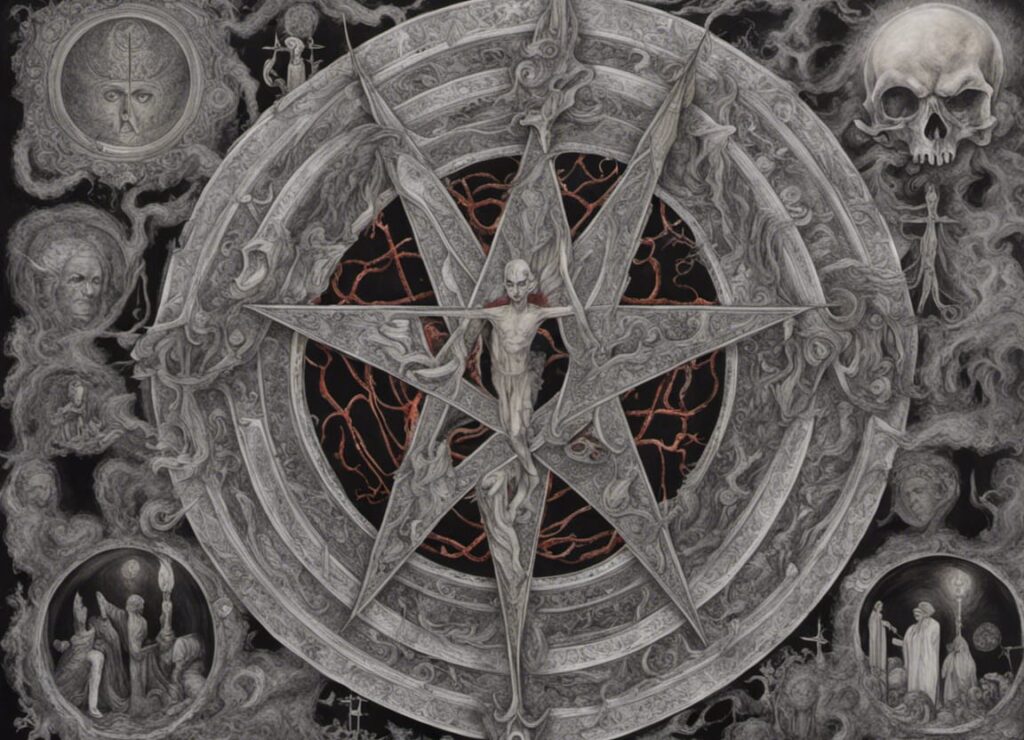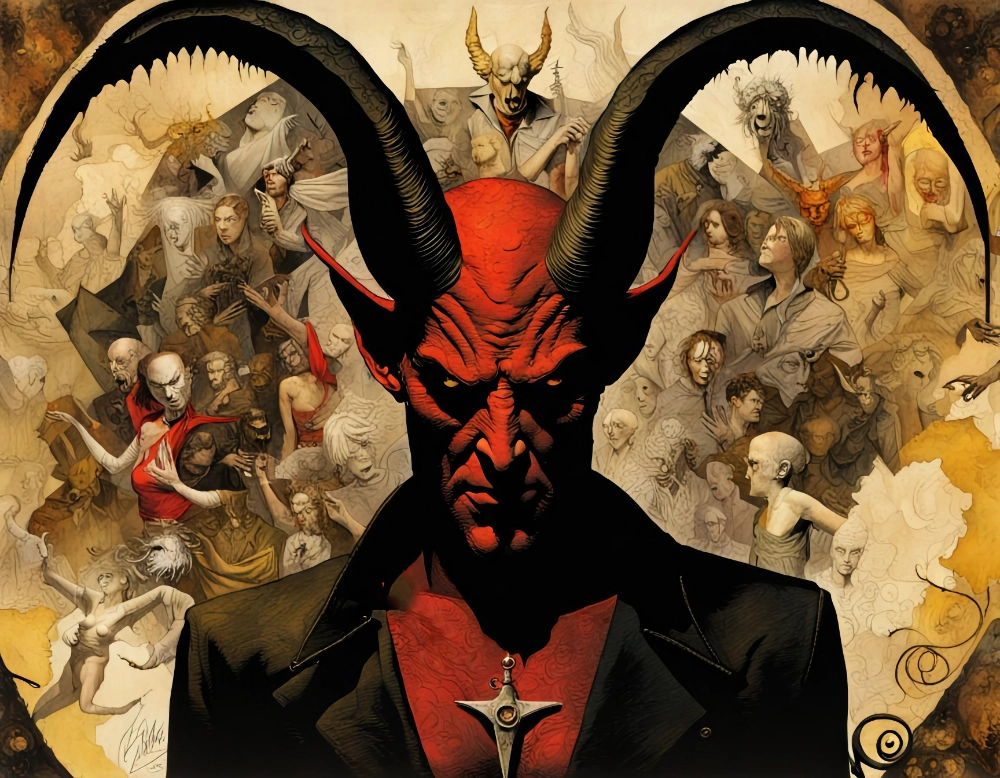Satanism has long been shrouded in mystery, intrigue, and misunderstanding. Often associated with dark rituals, malevolent deeds, and devil worship, it has been the subject of countless misconceptions throughout its history. However, the reality of Satanism is far more complex and diverse than the popular stereotypes suggest. In this article, we will explore the evolution of Satanism and dispel some of the common misconceptions that surround it.
Origins of Satanism
Satanism, as a term, finds its roots in the Christian tradition, where “Satan” represents the adversary of God. The concept of Satanism, however, can be traced back to ancient civilizations. In various cultures, there were beliefs in deities or figures that embodied rebellious or adversarial qualities. For instance, in ancient Egypt, Set was considered a deity associated with chaos and disorder, while in ancient Persia, Ahriman represented the principle of evil.
The modern practice emerged in the 20th century as a reaction to societal norms, religious dogma, and the constraints placed upon individual freedoms. Anton LaVey, an influential figure in the development of modern Satanism, founded the Church of Satan in 1966. LaVey’s brand, known as LaVeyan Satanism, rejected the supernatural and instead emphasized individualism, self-indulgence, and the rejection of arbitrary moral codes.

Types of Satanism
Satanism is not a monolithic belief system; rather, it encompasses a variety of interpretations and practices. Some of the notable branches of Satanism include:
- LaVeyan: As mentioned earlier, LaVeyan Satanism, founded by Anton LaVey, is atheistic and rejects the existence of a literal Satan. It focuses on self-empowerment, personal responsibility, and the pursuit of individual desires.
- Theistic: Unlike LaVeyan, theistic Satanists believe in the existence of a supernatural Satan and often engage in rituals and worship. However, their beliefs and practices can vary widely.
- Luciferianism: Luciferianism is a philosophical and religious movement that venerates Lucifer as a symbol of enlightenment and knowledge. It often incorporates elements of Gnosticism and Hermeticism.
- Satanic Temple: The Satanic Temple, founded in 2013, is a non-theistic organization that uses Satan as a symbol to advocate for secularism, religious freedom, and the separation of church and state. They have gained notoriety for their activism and legal battles.
Misconceptions
Despite the diversity within Satanism, numerous misconceptions persist:
- Devil Worship: One of the most common misconceptions is that all Satanists engage in devil worship. In reality, many Satanists, particularly LaVeyan Satanists and members of the Satanic Temple, do not believe in a literal Satan and do not engage in worship of any deity.
- Ritual Sacrifice: Another pervasive myth is the idea that Satanists engage in ritualistic human or animal sacrifices. Such practices are illegal and have no basis in any legitimate form of Satanism.
- Evil Intentions: Satanists are often portrayed as malevolent individuals with harmful intentions. In truth, many Satanists focus on self-improvement, personal growth, and ethical behavior, often emphasizing empathy and compassion.
- Criminal Activities: Contrary to popular belief, being a Satanist does not equate to criminal behavior. The vast majority of Satanists are law-abiding citizens who exercise their right to religious freedom.
Satanism has evolved over the years and encompasses a wide range of beliefs and practices, many of which do not align with the common misconceptions that persist. It is essential to approach the topic with an open mind and a willingness to understand the diversity within this complex and often misunderstood belief system. Dispelling these misconceptions allows for a more nuanced and accurate perception of Satanism and its followers, promoting tolerance and respect for individual beliefs and practices.
Related Books
-
 THE SCORPION GOD: Forbidden Wisdom of Belial by Mark Alan Smith – Hardcover Edition$105.00 — or
THE SCORPION GOD: Forbidden Wisdom of Belial by Mark Alan Smith – Hardcover Edition$105.00 — or$105.00Original price was: $105.00.$26.25Current price is: $26.25. / month for 4 monthsRated 5.00 out of 5 based on 2 customer ratings -
 QUEEN OF HELL by Mark Alan Smith – Primal Craft Hardcover Edition$105.00 — or
QUEEN OF HELL by Mark Alan Smith – Primal Craft Hardcover Edition$105.00 — or$105.00Original price was: $105.00.$26.25Current price is: $26.25. / month for 4 monthsRated 4.40 out of 5 based on 5 customer ratings -
 THE RED KING by Mark Alan Smith (Hardcover Edition)$105.00 — or
THE RED KING by Mark Alan Smith (Hardcover Edition)$105.00 — or$105.00Original price was: $105.00.$26.25Current price is: $26.25. / month for 4 months -
 THE WITCHBLOOD GRAIL: The Second Volume in the Trilogy, The Way of Sacrifice by Mark Alan Smith (Signed, Sigilized and Consecrated Limited Edition)$105.00 — or
THE WITCHBLOOD GRAIL: The Second Volume in the Trilogy, The Way of Sacrifice by Mark Alan Smith (Signed, Sigilized and Consecrated Limited Edition)$105.00 — or$105.00Original price was: $105.00.$26.25Current price is: $26.25. / month for 4 monthsRated 5.00 out of 5 based on 4 customer ratings -
 THE ALTAR OF SACRIFICE by Mark Alan Smith – 2nd Primal Craft Hardcover Edition$105.00 — or
THE ALTAR OF SACRIFICE by Mark Alan Smith – 2nd Primal Craft Hardcover Edition$105.00 — or$105.00Original price was: $105.00.$26.25Current price is: $26.25. / month for 4 monthsRated 4.00 out of 5 based on 1 customer rating -
 LIBER BARATCHIAL: The Spiritual Poison and the Alchemical Katharsis by Edgar Kerval – Limited Edition Hardcover$69.00 — or
LIBER BARATCHIAL: The Spiritual Poison and the Alchemical Katharsis by Edgar Kerval – Limited Edition Hardcover$69.00 — or$69.00Original price was: $69.00.$17.25Current price is: $17.25. / month for 4 months -
 THE ALTAR OF QAYIN by Mark Alan Smith (Limited Edition Hardcover)$105.00 — or
THE ALTAR OF QAYIN by Mark Alan Smith (Limited Edition Hardcover)$105.00 — or$105.00Original price was: $105.00.$26.25Current price is: $26.25. / month for 4 monthsRated 5.00 out of 5 based on 1 customer rating -
 LIBER BARATCHIAL: The Spiritual Poison and the Alchemical Katharsis by Edgar Kerval – Deluxe Leather Bound Limited Edition$169.00 — or
LIBER BARATCHIAL: The Spiritual Poison and the Alchemical Katharsis by Edgar Kerval – Deluxe Leather Bound Limited Edition$169.00 — or$169.00Original price was: $169.00.$42.25Current price is: $42.25. / month for 4 months -
 APOTHEOSIS: The Ultimate Beginner’s Guide To Luciferianism & The Left-Hand Path by Michael W. Ford – Hardcover Edition$79.00 — or
APOTHEOSIS: The Ultimate Beginner’s Guide To Luciferianism & The Left-Hand Path by Michael W. Ford – Hardcover Edition$79.00 — or$79.00Original price was: $79.00.$19.75Current price is: $19.75. / month for 4 months











